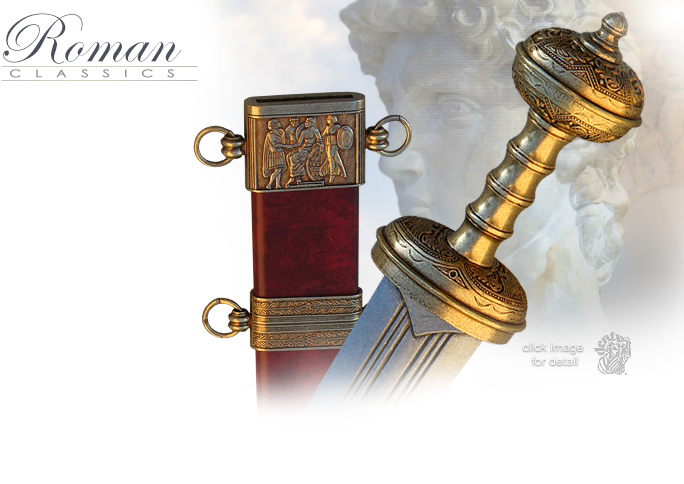ROMAN SWORD  (Brass tone) SD4116L by DENIX (Brass tone) SD4116L by DENIX
The Roman Sword, or Gladius, evolved from weapons captured during the Romans campaign in the Iberian peninsula. By the first century A.D., it had been refined to the form shown in this replica by Denix of Toledo Spain. The handle and scabbard are engraved and embossed in antiqued brass finish with classic Roman designs. The 20 1/4" cast metal blade of this replica sword is 2.5" wide with a distinctive blood groove. The blades of Denix daggers and swords are cast from a metal alloy and cannot be sharpened, making them safe for display in family environments. As an additional benefit of cast alloy material, the blade loudly produces the "classic ring sound" when quickly drawn from its scabbard making this a perfect piece for film or live theatre stage. Overall Length in Scabbard: 29 1/4".
Read more on Decorative Series Swords
|
|

• Overall Length: 28 1/4"
• Blade Length: 20"
• Handle Length: 8 1/4"
• Blade Edge: semi-sharpened
• Blade Material: Zinc Alloy
• Blade Width at Guard: 2 1/2"
• Hilt: Antiqued Brass Cast Metal Alloy
• Scabbard: Wood/sim leather/Zinc Fittings
• Weight: 3 lbs 10 oz

Specs may vary slightly from piece to piece.
|
The Gladiator and his Gladius
"Dating back nearly 2,100 years this extraordinary blade represented the height of weaponry during Rome's barbaric fascination with gladiatorial combat. According to Methos, its short broader based blade made it lighter and easier to maneuver which was key strategy when the fighting wore on. "The longer the battle, the worse it was," he said. "I watched men so crippled with fatigue that they could barely lift their swords from the ground. When that happened it was, of course, their death knell." Methos salvaged the blade from the beheaded body of a fallen gladiator who had been left to the whims of the vultures. "Removing any article from a dead gladiator was vehemently forbidden and punishable by crucifixion," he said. "But his fate held such powerful symbolism for an Immortal."
|